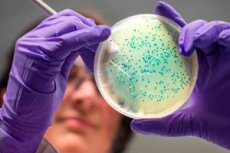New goals: reduce deaths from antibiotic resistance and improve access to them
Last reviewed: 14.06.2024

All iLive content is medically reviewed or fact checked to ensure as much factual accuracy as possible.
We have strict sourcing guidelines and only link to reputable media sites, academic research institutions and, whenever possible, medically peer reviewed studies. Note that the numbers in parentheses ([1], [2], etc.) are clickable links to these studies.
If you feel that any of our content is inaccurate, out-of-date, or otherwise questionable, please select it and press Ctrl + Enter.

Access to effective antibiotics is essential for all healthcare systems in the world. Antibiotics prolong life, reduce disability, reduce health care costs, and enable other life-saving medical interventions such as surgery. However, antimicrobial resistance (AMR) threatens this foundation of modern medicine and is already causing deaths and illnesses that were previously preventable.
Speaking at the World Health Assembly on 28 May 2024, leading scientists behind a new Lancet series, including researchers from St George's University in London, call for urgent global action to combat AMR to ensure more sustainable access to antibiotics and increase investment in new antibiotics, vaccines and diagnostics.
Every year, about 7.7 million deaths worldwide are caused by bacterial infections - that's 1 in 8 of all global deaths, making bacterial infections the second leading cause of death in the world. Of these, nearly 5 million deaths are attributed to bacteria that have developed resistance to antibiotics.
Scientists warn that unless the world prioritizes action to combat AMR now, we will see a gradual increase in global deaths, with infants, older adults and people with chronic illnesses or requiring surgery most at risk.
Improving and expanding existing infection prevention practices—such as use of pediatric vaccines, hand hygiene, routine cleaning and sterilization of equipment in health care settings, availability of safe drinking water, and effective sanitation—could prevent more than 750,000 AMR-related deaths annually in low- and middle-income countries.
Goals “10-20-30 by 2030”
In the Lancet series on AMR, a paper by Professor Mike Sharland and colleagues proposes ambitious but achievable global targets for achieving more sustainable access to effective antibiotics: the "10" targets -20-30 by 2030":
- 10% reduction in deaths from AMR by scaling up public health interventions to prevent infections, reducing both antibiotic use and resistance, and providing greater access.
- 20% reduction in inappropriate use of antibiotics in humans.
- 30% reduction in inappropriate use of antibiotics in animals, which can be achieved through gradual action across different sectors.
They believe these goals should be adopted at the upcoming high-level meeting of the UN General Assembly in September 2024 as part of universal access to effective antibiotics.
“The Lancet series on AMR focuses on the need for clear and achievable targets to combat AMR, with the panel recommending a 20% reduction in inappropriate antibiotic use. The ADILA project, a collaboration between St George's University and the University of Oxford, has led the modeling of potential future optimal use targets.
“The ADILA team showed that current global patterns of antibiotic use are not fair or equitable, with low-income countries bearing a higher burden of infections and deaths and using fewer antibiotics. Future antibiotic targets must be based on a risk-based approach,” says Professor Sharland.
To ensure these goals are met, Professor Sharland and other AMR experts will also call for the creation of an independent scientific body, the Independent Panel on Antibiotic Access and Resistance, to broaden the evidence base for policy and inform new targets. p>
